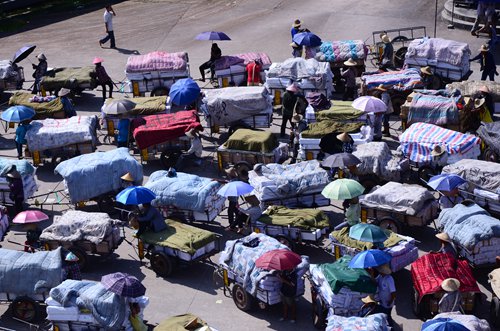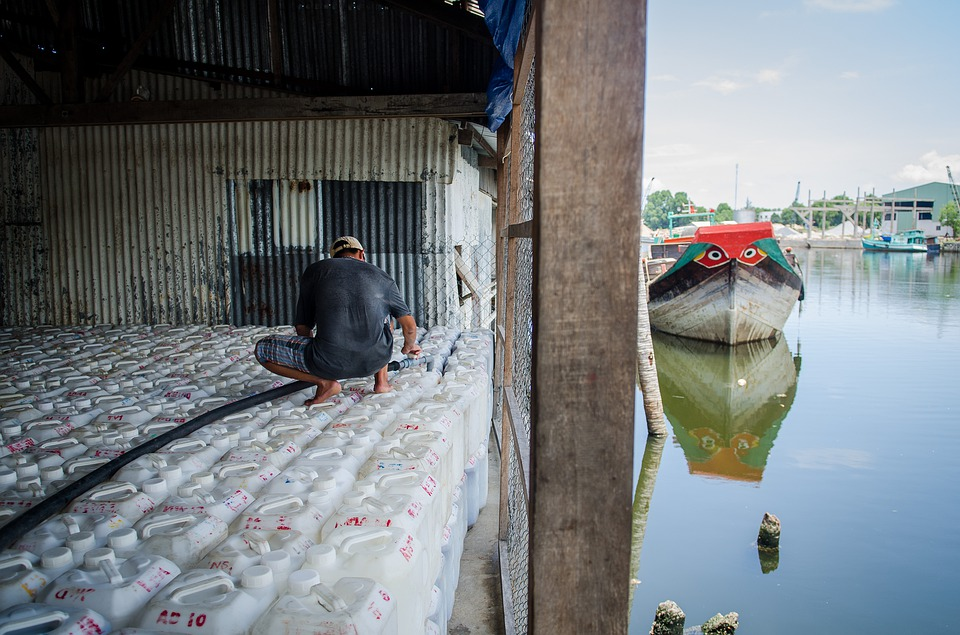
Carts carrying imported good from Vietnam enter Lihuokou Port of Fangchenggang, South China's Guangxi Zhuang Autonomous Region on September 28.
The border areas in South China's Guangxi Zhuang Autonomous Region have become more open as growing numbers of Vietnamese cross the border to work and trade.
The Vietnamese workers are welcomed by local Chinese residents as they have made up the shortage of laborers and work for lower salaries.
"The exchange in laborers not only strengthens the communication between border residents in China and Vietnam, but can also enhances the friendship between the two countries," Gu Xiaosong, an expert on Southeast Asian Studies at the Guangxi Academy of Social Sciences, told the Global Times on Wednesday.
Daily exodus
Every morning in Dongxing, a border city in southern Guangxi, Vietnamese laborers pour into China through the border gate to begin their daily work.
According to the immigration inspection station at Dongxing, 25,000 people cross the Sino-Vietnamese border through the Dongxing port daily, including around 10,000 migrant workers from Vietnam, The Beijing News reported.
China's Dongxing and Vietnam's Mong Cai are a pair of small cities separated by a border river, so it is very convenient for the residents to cross the border for work and trade, Gu said, noting that the similar language and lifestyle of people in the two cities have made the exchange much easier.
Nowadays, it takes a person just five to 10 seconds to cross the border using self-service clearance by scanning the barcode on the certificate for nearby residents, said The Beijing News.
Thanks to the openness of the border, Vietnamese products including seafood, fruit and medicine can be bought in Dongxing.
Xiaofeng, a Vietnamese salesgirl in Dongxing, told The Beijing Times that Chinese bosses prefer Vietnamese employees, and Chinese tourists love to chat with them.
Now, Xiaofeng can earn even more than a university graduate student in Vietnam. "I can speak fluent Chinese, but other people who cannot could only do hard labor," she said.
At 9 pm, the Vietnamese workers, carrying bags filled with Chinese products, go back to their country.
In Pingxiang, another small border city in Guangxi, 270 kilometers away from Dongxing, more than 1,000 Vietnamese work and live in local furniture factories and fruit markets.
"The Vietnamese workers are very welcome in the China side, as we lack laborers - hardly any Chinese workers come to work in the border areas, as they prefer economically advanced regions such as Guangdong Province," a Pingxiang resident, surnamed Peng who trades red sandalwood furniture between China and Vietnam, told the Global Times on Wednesday.
Most of them can communicate in simple Chinese, and there is always a worker who can speak Chinese to lead the others, Peng said.
According to Peng, an experienced carpenter can earn as much as 9,000 yuan a month, and a beginner around 2,000 yuan, which is still much better than what they can get in Vietnam.
"However, most Vietnamese workers are not as educated, skilled or hardworking as the Chinese, so the salaries are slightly lower than for Chinese carpenters," Peng said.
Everybody wins
"Vietnamese coming across the border to work in China is a win-win," Gu said.
"The Vietnamese workers earn more in China, which can improve their living standards," Gu said, adding that these people make up the vacancies left by Chinese border residents who have gone to seek their fortune in more advanced areas such as the Pearl River Delta.
Moreover, local people from China and Vietnam, and even the two countries, can enhance communication and friendship from rising exchanges, he noted.
"Guangxi people are not against foreigners, so they will not discriminate against the Vietnamese workers," Zhong Jing, a Guangxi resident in the capital city Nanning, told the Global Times.
However, the visas issued to Vietnamese workers only lasts one month, so they have to go back to reapply every month and pay the agencies around 600 yuan each time, according to Peng. "We hope the visa policy can be eased for Vietnamese workers so that they can work in the factories more regularly," Peng said.
Meanwhile, police in Dongxing also vowed to crack down on s=muggling at the port to better safeguard cross-border trade, the local procuratorate reported in September.
(source:globaltimes.cn)



























 沪公网安备31010402003309号
沪公网安备31010402003309号